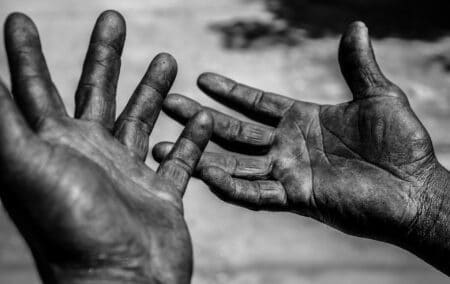Our ruling party is expected to benefit electorally from its anti-corruption efforts, while legal forms of patronage sink the economy. Basic income grant (BIG) debates can, and must, reset our politics.
Whereas little effort is needed to appreciate tenderpreneurial looting, the damage done by South Africa’s legal forms of patronage is greater but less obvious. For instance, BEE legislation stifles growth alongside an expensive and unaffordable civil service wage bill.
The trajectory of our economy is perilous for various reasons but two stand out. First, our debt costs are destined to outpace the economy. Second, productive young adults should be powering the economy to new highs but, instead, most are on track to be locked into perpetual poverty.
Having a huge, and growing, backlog of unemployed young adults can suppress growth for decades. In a best-case scenario, it would take at least two business cycles of sustained strong growth to meaningfully reduce our youth unemployment and poverty.
Instead, growth has barely kept pace with population growth for a decade. Averaging 1% growth in per capita income over the next decades seems out of reach.
The core problem is that the ANC’s economic policies are designed to benefit those who are members of the party or its alliance partners. This strategy has been a consistent winner electorally while sliding the economy into an ever deeper hole.
It has become clear in recent months that the ANC has no appetite for the challenging policy pivots required to achieve sustained high growth. If they can safely presume that their grip on power will extend beyond the 2024 election, the window for structural reforms will close.
Amid a credit crisis, the IMF could negotiate some policy concessions. This would not however be sufficient to provoke sustained high growth.
Rather, our best hope for achieving necessary policy shifts is that debating BIG policies should serve as a catalyst for a more realistic political dialogue. The ANC’s grip on power reflects the broadly held perception that their policies are justified to redistribute wealth and income from those who benefited from the former regime to those who suffered under it.
Perpetual poverty
But the BIG debates are inspired by the fact that a majority of young South Africans face perpetual poverty. This is totally unnecessary. BIG would simply be yet another form of patronage to retain support amongst its wavering base of supporters, not dissimilar to a raft of measures that favour politically connected groups.
The ANC seems on track to dodge a meaningful electoral penalty for the large-scale corruption it has provoked. Can it also manage to elude responsibility for devastating the prospects of most young South Africans?
Taxpayers and investors do not constitute major voting constituencies. Conversely, the unemployed and the poor constitute a majority of the electorate.
Big business and affluent taxpayers cannot easily align as a voting constituency with the unemployed and the poor. Thus, the ANC has been able to seek the votes of the disadvantaged while campaigning against inequality, which is a half-veiled attack on affluent whites and big business generally.
The previously advantaged have accepted the political imperative for considerable redistribution but they are justifiably unhappy about the nation’s general economic prospects. The poor, particularly low-income younger adults, have been coming to accept that their prospects are generally awful.
What has changed quite recently is that most young adults have come to accept that they will never be meaningfully employed. The ANC’s earlier campaigning had emphasised jobs. Debating BIG programmes spotlights that many millions live subsistence life-styles.
The ANC’s transition from a liberation movement to a ruling party was packaged politically around providing jobs and overcoming inequality. Our economy’s capacity to employ young adults is woefully inadequate and this is nowhere near being corrected.
More entrenched and less racial
Inequality has become more entrenched and less racial. There is roughly as much inequality among blacks as between blacks and whites.
ANC speech writers would have everyone believe that South Africa’s difficulties can be traced to apartheid. Seasoned scholars can work out that this is far less true than it was, say, ten years ago. But scholars are not a significant voting bloc.
The far bigger problem for the ANC is the young adult who says, ‘I don’t care about history or politics, I just want a job.’ If, in response, the best the ANC leadership can offer is not a job but rather a few hundred rand per month, the potential backlash could put the nation on a much more favourable path.
Nothing has more potential to reset our politics for the better than BIG debates.
[Image: rodrigoandrade3880 from Pixabay]
The views of the writer are not necessarily the views of the Daily Friend or the IRR
If you like what you have just read, support the Daily Friend


